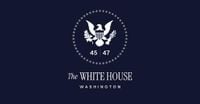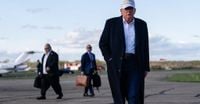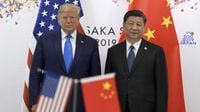President Donald Trump has made headlines again by signing a series of executive orders aimed at reshaping immigration policies and law enforcement practices on April 28, 2025. These actions, which include a requirement for English proficiency among commercial truck drivers and the establishment of a national list of sanctuary cities, signal a significant shift in the administration's approach to immigration enforcement.
The new executive orders come as Trump approaches the 100-day mark of his second term, a period characterized by a flurry of activity intended to fulfill his campaign promises. Among the most notable orders is one that directs the attorney general and the Department of Homeland Security (DHS) to seek court orders against cities that do not comply with federal immigration laws. White House press secretary Karoline Leavitt stated that these sanctuary cities "obstruct" enforcement efforts, which has drawn criticism from various quarters.
In a related measure, Trump signed an order requiring English-language proficiency for commercial motor drivers, a mandate that he claims has not been enforced in years. "My administration will enforce the law to protect the safety of American truckers, drivers, passengers, and others," Trump asserted during the announcement. This requirement aims to address safety concerns on the roads, which the administration argues have been compromised due to communication barriers among drivers.
These executive actions, however, are not without controversy. Just days before Trump's signing, a federal judge in California had blocked the administration from withholding federal funds from sanctuary jurisdictions, declaring parts of Trump's previous executive orders unconstitutional. The legal challenges to his immigration policies have been mounting, and the administration appears prepared for further litigation as it implements these new directives.
In addition to immigration reforms, Trump celebrated the Philadelphia Eagles' Super Bowl victory during a White House event held the same day. The celebration was marked by the absence of star quarterback Jalen Hurts, who, along with several teammates, cited scheduling conflicts for not attending. Trump took the opportunity to mock pop star Taylor Swift, a known Kansas City Chiefs supporter, saying, "I watched in person, I was there along with Taylor Swift. How did that work out?" This comment drew laughter from the audience but also highlighted the ongoing cultural tensions surrounding the administration.
As the nation grapples with Trump's immigration policies, new polling indicates a decline in his approval ratings, which now sit in the low-to-mid-40s. Many Americans express disapproval of his handling of the economy, a critical issue as the country faces potential recession fears. The S&P 500 has dropped 10% from its all-time high earlier this year, and economic experts warn that the volatility in the markets may affect retirement savings for many Americans.
Amid these challenges, the Trump administration is also facing scrutiny over its handling of race-based discrimination investigations, particularly concerning the Harvard Law Review. Reports have surfaced alleging that the administration is investigating the journal's membership policies, claiming they may violate Title VI of the Civil Rights Act of 1964. A spokesperson for Harvard Law stated that a similar claim was dismissed by a federal court in 2018, raising questions about the motives behind the current investigations.
In the realm of education, Trump has directed the U.S. Department of Education to investigate whether New York officials violated federal laws regarding Native American mascots. This directive follows the refusal of a Long Island school district to comply with a state requirement to eliminate Native American references in its mascots. Trump has positioned himself as a defender of the district, asserting that the investigation is necessary to uphold federal laws.
As the administration pushes forward with its agenda, it also faces protests and opposition from various groups. College Democrats at the University of Alabama are organizing a rally titled "Tide Against Trump" to protest the president's upcoming visit to the campus for a commencement event. The rally reflects a growing discontent among younger voters who feel marginalized by the current administration.
Moreover, Trump's recent comments about the ongoing war in Ukraine illustrate the complexities of his foreign policy approach. While he pledged to end the conflict within 24 hours of taking office, the war continues, with both Russian and Ukrainian forces engaged in fierce battles. Trump has expressed skepticism about the prospect of a peace deal, attributing blame to both Ukrainian President Volodymyr Zelenskyy and Russian President Vladimir Putin.
As Trump navigates these multifaceted challenges, his administration remains focused on consolidating power and pushing through its legislative agenda. House Speaker Mike Johnson has expressed confidence in the Republican Party's ability to maintain its majority in the upcoming midterm elections, despite Trump's declining approval ratings. Johnson stated, "We’re very bullish on it," highlighting the party's commitment to advancing Trump's policies.
In summary, Trump's recent executive orders on immigration and law enforcement mark a pivotal moment in his administration's second term. As he confronts legal challenges, declining approval ratings, and mounting opposition, the coming weeks will be crucial in determining the trajectory of his presidency. With a focus on enforcement and a commitment to his base, Trump continues to shape the political landscape in ways that will resonate throughout the country.






